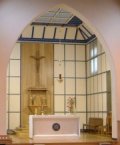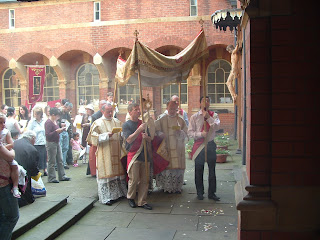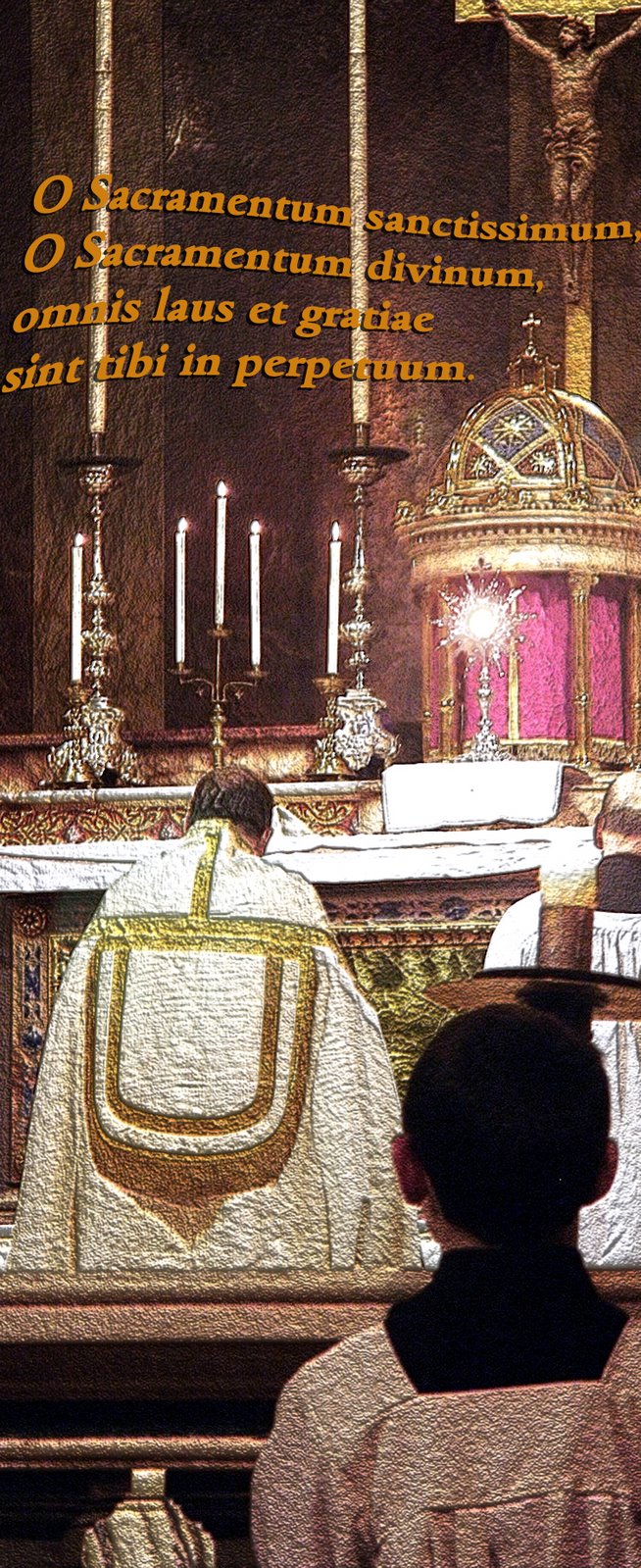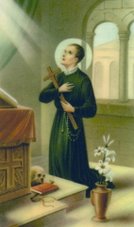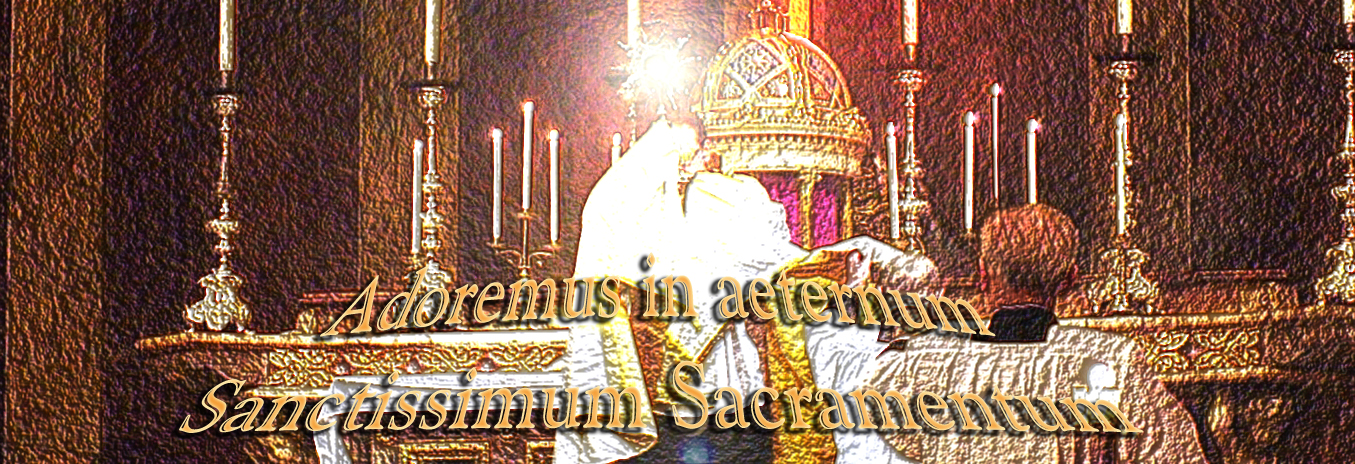This feast was a spectacular treat. Not only was it the Solemn High Mass practised for centuries to nourish the Saints, but was concluded with Solemn Benediction of the Blessed Sacrament, and a procession around the church singing
Pange Lingua to which we are familiar from its closing verses,
Tantum Ergo, sung at regular Benediction. St Thomas Aquinas provided us with such wonderful hymns, including the sequence
Lauda Sion also sung as part of today's Mass.

The purpose of today is clear; to celebrate the wonderful gift of our salvation, present under the simple appearance of bread and wine. This is a similar mystery to that of our own life; our simple flesh and bones, and our humble works and labours, are divinised by God and transformed into beautiful channels of grace and charity. Wendy was particularly moved by reading, again and again, the translation of the words of consecration said by the Priest over the chalice:
TAKE AND DRINK YE ALL OF THIS, FOR THIS IS THE CHALICE OF MY BLOOD, OF THE NEW AND ETERNAL TESTAMENT: THE MYSTERY OF FAITH: WHICH SHALL BE SHED FOR YOU AND FOR MANY UNTO THE REMISSION OF SINS.
This 'mystery of faith', the transubstantiation, has been carefully safeguarded and expounded throughout the centuries in the vehicle Christ established: The One, Holy, Catholic and Apostolic Church. The mystery of the Mass, the partaking of Christ's Body and Blood, is one of the hardest mysteries to grasp and believe by others. In fact, when sects break away from the Church it is often this tenet of the Faith which is disregarded and cast away. During the English 'Reformation', the whole practice of the faith, particularly the Missal, was rewritten to eradicate this overarching influence. It is not surprising then, that one of the most controversial things Jesus said was concerning his identity as the Bread of Life
(St. John 6:56-67):
"For my flesh is meat indeed: and my blood is drink indeed. He that eateth my flesh, and drinketh my blood, abideth in me, and I in him. As the living Father hath sent me, and I live by the Father; so he that eateth me, the same also shall live by me. This is the bread that came down from heaven. Not as your fathers did eat manna, and are dead. He that eateth this bread, shall live for ever."
Many therefore of his disciples, hearing it, said: "This saying is hard, and who can hear it?"
But Jesus, knowing in himself, that his disciples murmured at this, said to them: "Doth this scandalize you? If then you shall see the Son of man ascend up where he was before? It is the spirit that quickeneth: the flesh profiteth nothing. The words that I have spoken to you, are spirit and life. But there are some of you that believe not."
After this many of his disciples went back; and walked no more with him.

The Church joyfully proclaims this teaching of Christ on this feast day. It is set on a Thursday to recall the day of its institution, during Our Lord's Last Supper. Free from the purple robes of mourning present on Maundy Thursday, this day the Oratory was resplendent with candles, organ music, and golden vestments. The Choir treated us with Palestrina's
Missa Papae Marcelli, which struck me as a wonderful balance between the more symphonic, operatic Mass settings of its period, and the noble simplicity of Gregorian Chant.
The Epistle is well worth a mention (
Corinthians 11:23-29), since the
Novus Ordo lectionary only has it once every 3 years (correct me if I'm wrong), and cuts it distinctly short before St. Paul's stronger admonition:
Brethren, I have received of the Lord that which also I delivered unto you, that the Lord Jesus, the same night in which he was betrayed, took bread. And giving thanks, broke, and said: Take ye, and eat: this is my body, which shall be delivered for you: this do for the commemoration of me. In like manner also the chalice, after he had supped, saying: This chalice is the new testament in my blood: this do ye, as often as you shall drink, for the commemoration of me. For as often as you shall eat this bread, and drink the chalice, you shall shew the death of the Lord, until he come. Therefore whosoever shall eat this bread, or drink the chalice of the Lord unworthily, shall be guilty of the body and of the blood of the Lord. But let a man prove himself: and so let him eat of that bread, and drink of the chalice. For he that eateth and drinketh unworthily, eateth and drinketh judgment to himself, not discerning the body of the Lord.
Quite why the last portion is left out of the new lectionary I will leave to the imagination. But surely this is an important part to note? With regards to apologetics, St. Paul would never have spoken this strongly about a merely symbolic act. He is implying sacrilege, which is a worthy consideration in offering fitting worship to the True God, present Body and Blood, Soul and Divinity. In the wider context of what St. Paul was writing to the Corinthian church; their degradation of the Lord's Supper into a common feast put them in a dangerous position before God, resulting in curses such as weakness, infirmity and even death.

Fr Paul Chavasse, celebrant, touched thoughtfully on this during his sermon. We should be grateful that we live in an age of the Church where we have the privilege of regular and frequent reception of Holy Communion (I think Pope St Pius X did a lot to encourage this during his pontificate at the beginning of last century). But that should not mean that we do so carelessly: we should have frequent recourse also to the sacrament of confession, where we reconcile ourselves to Christ through forgiveness of our sins and receive the special graces we need to reform our lives.

Fr Paul also spoke eloquently about this feast's position in the calender just after Pentecost, when we think carefully about the way the Holy Spirit works not just in our immediate lives but over the course of many centuries in the Church's life. I would say that we cannot expect the Holy Spirit to create a sudden reform of the Church as seen by the pentecostals: such sudden, thoughtless impulses may bring about far worse and open up disastrous consequences. We must trust in prayer, integrity and self sacrifice. Only by living our lives through a child-like faith in the Church can we hope to be led by the Spirit to reform ourselves and others. Such is the example of the Saints and Apostles. When Our Lord asked them "
Will you also go away?" Simon-Peter answered "
Lord, to whom shall we go? thou hast the words of eternal life. And we have believed and have known, that thou art the Christ, the Son of God." Let us be one with St. Peter, the Rock on which we build our Faith, and humbly trust that even in those things we do not understand, we can be led to all Truth.








 I'm sorry for winding everyone up with that last post.
I'm sorry for winding everyone up with that last post.
 The altar of the LORD you cover with tears, weeping and groaning, because He no longer regards your sacrifice nor accepts it favourably from your hand; And you say, "Why is it?"-- Because the LORD is witness between you and the wife of your youth, with whom you have broken faith though she is your companion, your betrothed wife. Did He not make one being, with flesh and spirit: and what does that one require but godly offspring? You must then safeguard life that is your own, and not break faith with the wife of your youth.
The altar of the LORD you cover with tears, weeping and groaning, because He no longer regards your sacrifice nor accepts it favourably from your hand; And you say, "Why is it?"-- Because the LORD is witness between you and the wife of your youth, with whom you have broken faith though she is your companion, your betrothed wife. Did He not make one being, with flesh and spirit: and what does that one require but godly offspring? You must then safeguard life that is your own, and not break faith with the wife of your youth.  Jesus then explained to us that what God has joined together, therefore, no man can put asunder. The married couple are no longer two, but one flesh. Marriage was instituted, not by men, but by God. It is a true and real sacrament which Christ restored to its original dignity through his salvific action in his life, death and resurrection. The marriage bond, united by Christ himself, grants abundant graces to the married couple which allow them to fulfill their duties of this magnificent covenant.
Jesus then explained to us that what God has joined together, therefore, no man can put asunder. The married couple are no longer two, but one flesh. Marriage was instituted, not by men, but by God. It is a true and real sacrament which Christ restored to its original dignity through his salvific action in his life, death and resurrection. The marriage bond, united by Christ himself, grants abundant graces to the married couple which allow them to fulfill their duties of this magnificent covenant.


 The Priest listens and absolves with the authority of Christ Himself. It is Jesus who acts in a supernatural way to wash us clean of guilt and bitterness. Our humility is rewarded with endless compassion and strength. All we have to do is go.
The Priest listens and absolves with the authority of Christ Himself. It is Jesus who acts in a supernatural way to wash us clean of guilt and bitterness. Our humility is rewarded with endless compassion and strength. All we have to do is go.
